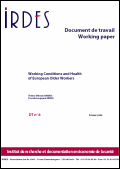
WORKING PAPERS 2013
WP n° 56
Our results show that, in public hospitals both the number of cases treated and the case-mix adjusted production has increased significantly between 2004 and 2009 and for all types of activities, with a more striking increase in surgery. In private for profit hospitals, a strong increase of ambulatory procedures and surgery was observed simultaneously with a reduction in full-time hospitalizations in obstetrical and medical cases. Overall, we observe an upward trend in the productivity (relationship between the production and the resources used) of public hospitals since 2004 whereas in the private sector, we note a modification of activity (case-mix) more than a significant increase in production and productivity. Besides, the rates of readmission in 30 days for the main cardiovascular diseases and cancer increased since the introduction of the T2A. With the indicators used, we did not observe a strategy of discrimination of the older and multiple-disease patients by hospitals. But the strong increase in the standardized rates of certain interventions/procedures is suggestive of induced demand that is little justified. |
WP n° 55
The hourly wage rate among individuals with a poor self-assessed health status is on average 13.8% lower than among individuals with a good self-assessed health status. This gap narrows, however, for individuals suffering from long-term chronic illness and activity limitations; 6% and 1.2% respectively. Wage gap decomposition shows that the ‘unexplained factor' that can be attributed to wage discrimination amounts to 65% of the wage gap for poor self-assessed health status against 51% for activity limitations and long-term illness. |
WP n° 54
Declared behavior from a cross-sectional study based on participants in the French Health, Health Care and Insurance Survey of 2008. The determinants of having changed one's prescription drugs consumption following the introduction of deductibles were explored based on the socio-behavioral model of Andersen and an economic model of drug demand. The empirical analysis used a logistic regression. All other factors being equal, individuals' probability of having modified their drug consumption behaviour following the introduction of deductibles decreases with income level and health status (self-assessed health and suffering from a chronic disease). Deductibles on prescription drugs represent a significant financial burden for low-income individuals and those in poor health, with the potential effect of limiting their access to drugs. |

